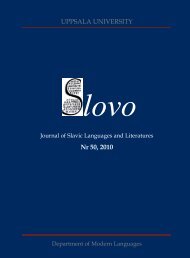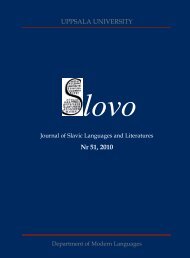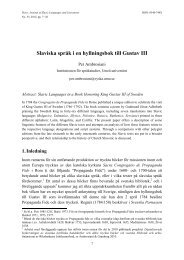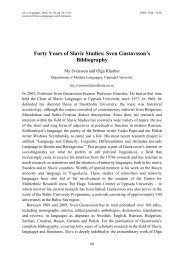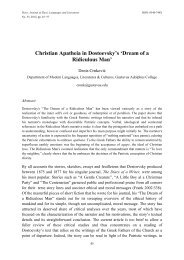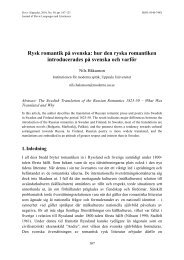Full text PDF - Index of - Uppsala universitet
Full text PDF - Index of - Uppsala universitet
Full text PDF - Index of - Uppsala universitet
You also want an ePaper? Increase the reach of your titles
YUMPU automatically turns print PDFs into web optimized ePapers that Google loves.
Slovo.<br />
Journal <strong>of</strong> Slavic Languages and Literatures<br />
My Russian informants 17 confirm that the English translation in this case is misleading<br />
with the quantifier “always”, suggesting a habitual interpretation, while the Russian<br />
original should rather be interpreted as reporting on more or less accidental event<br />
plurality. A search in the monolingual Russian National Corpus provides several<br />
examples with the present (perfective or imperfective) under byvalo, čto:<br />
(57) Переезд на подводах практиковался в радиусе до 40 верст, с расчетом,<br />
чтобы подвода к вечеру могла добраться до дачи. Бывало[up, uipf], что<br />
дачники приедут[un, upf], а подводы нет, спать не на чем. (Russian<br />
National Corpus)<br />
The same mechanism that is responsible for the present tense under byvalo should also<br />
explain the present tense under byvalo, čto in examples such as (54) and (57). This<br />
raises the question: Do we find SOT effects with implicatives in SOT languages?<br />
Indeed, we do find such data. In fact, we also run into some (more or less familiar)<br />
problems for SOT theories. Consider the English (or Norwegian) construction below:<br />
(58) Но в тридцатилетней практике бухгалтера не было случая, чтобы ктонибудь,<br />
будь то юридическое или частное лицо, затруднялся бы принять<br />
деньги. (Michail Bulgakov, “Master i Margarita”)<br />
(59) But there had[up] been no case in the bookkeeper’s thirty years <strong>of</strong> experience<br />
when anyone, either an <strong>of</strong>ficial or a private person, had[up] had a difficult<br />
time accepting money.<br />
(60) Men i hele bokholderens tredveårige praksis var[up] det ikke en eneste gang<br />
forekommet at en person, den være seg juridisk eller fysisk, hadde[up] vegret<br />
seg for å motta penger. (Norwegian)<br />
We can safely consider “to be the case…” a verbal quantifier with an “implicative”<br />
semantics (if it is true that “it is the case that P”, then P is obviously also true). The<br />
past tense on “had [up] had a difficult time” in the subordinate when-clause can be<br />
analysed as a case <strong>of</strong> tense agreement with the matrix past. However, there is no<br />
semantic justification for the presence <strong>of</strong> the verbal quantifier had in the when-clause<br />
(there is no backward shifted interpretation). Thus, although we can explain the<br />
morphological features <strong>of</strong> had, we cannot explain the presence <strong>of</strong> the quantifier itself.<br />
This problem, however, is also found in many other environments, such as in if-clauses<br />
under a past counterfactual operator:<br />
(61) Как бы он обрадовался, если бы узнал об этом! (Jurij Oleša, “Tri tolstjaka”)<br />
(62) How happy he would[up] have been if he had[up] known!<br />
(63) Så glad han ville[up] blitt om han hadde[up] visst det! (Norwegian)<br />
The “have” in the main clause is semantically a past time shifter locating the<br />
counterfactual hypothesis in the past. The past tense morphology on the counterfactual<br />
operator “would” as well as in “had” in the if-clause is so-called fake past, i.e. pastpro-subjunctive<br />
mood. As in the previous example, there is no semantic motivation for<br />
17 I thank Olga Dolžikova, Svetlana Krasikova and Tatiana Nikitina for discussion <strong>of</strong> the Russian data.<br />
78



